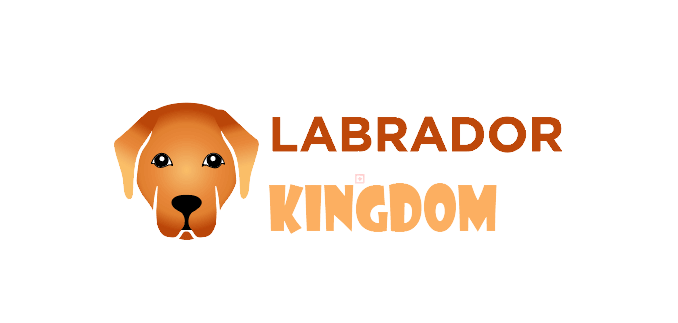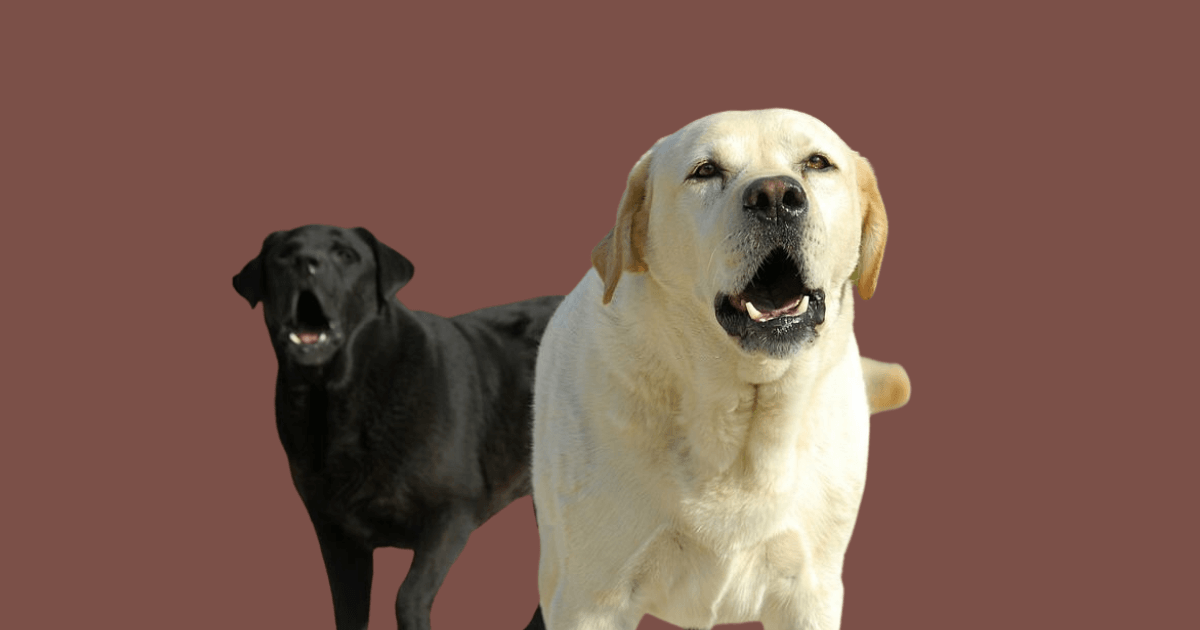Labrador growling can raise concerns for dog owners. But, labs express various emotions and needs through growling. Hence, it’s essential to differentiate between playful growling and aggressive behavior.
However, common concerns of Lab growling may arise during play, eating or protecting possessions. Indeed, proper training techniques secure a gentle nature. Besides, redirecting attention and rewarding positive behavior can minimize growling issues in Labradors.
Hence, owners can respond effectively by learning and interpreting their growls. Mutual kindness builds a strong bond between you and your lab. Let’s explore the different reasons, meanings and solutions of labrador yapping.
Significance of Learning Labrador Growling

Learning the accurate meaning of your Lab growling depends on early intervention. It helps create a harmonious environment between you and your faithful Labradors. Regular socialization works better for reducing aggressive growling. Further, ensuring mental peace also contributes to a well-behaved Labrador. Let’s learn about three major steps of growling:
A. Decoding Canine Communication through Growling
Growling acts like a dog’s language for chatting with us. It conveys different messages. Sometimes, a growl signifies joy or excitement. In other instances, it may indicate fear or a perceived threat.
Still, grasping the meaning behind a dog’s growl helps us comprehend their message. It’s their unique method of focusing on something to express. Thus, being attentive to their growls holds significance for establishing a strong connection between you and your cherished labs.
B. Different vocalizations in Labradors
Labradors use an array of sounds to convey themselves. This includes barking, whining and even growling. Of course, each sound holds its significance.
Barks may indicate excitement or alertness whereas whines might signal anxiety or a need. Indeed, knowing these vocalizations assists us in gauging Labradors’ emotions.
C. The Nuances of Labrador Growling
The growling carries distinct meanings too. Sometimes, it’s purely playful, like a cheerful invitation to have fun. In contrast, it may indicate unwillingness or uneasiness.
If you discern these nuances, you can react appropriately to the individual meaning of Lab growling. So, you can gladly join in if it’s the joyous growls of play.
However, you can offer comfort, suggesting worry or upset if it appears different. It revolves around comprehending their unique communication.
Unveil the Causes of Labrador Growling
Labradors love social interaction and find joy in the company of people. Their friendliness, loyalty, intelligence and gentle nature make them the most beloved dog breeds. Serving as guide dogs, therapy companions and cherished family pets, they are ideal for individuals and families.
Still, you may question whether lab growling is normal or concerning. To get clear solutions, you need to explore why labradors growling.
Territorial Instincts
Labradors might emit a growl when they need to safeguard their space. They ensure the safety of your dwelling or backyard besides their own space. This territorial instinct often shows as an extensive raising for growling behaviors.
Protective Behavior
Labradors may resort to growling as a cautionary signal in the presence of perceived threats or danger. Growling may be the expression of their intent to warn and shield.
Hence, growling can be their proclaiming, “I’m present, and I’ll ensure your safety.” This protective behavior is an innate instinct to save their owner from mishaps.
Playful Growling
Labradors occasionally integrate growling into their interactions during playtime. It’s their playful nature. They have fun together by growling while playing with you or their favorite mate or other pets. This form of growling also accompanies wagging tails and an overall joyful disposition.
Communicate with Humans and Other Dogs
Labradors use growling as a way of communication with both humans and another canine companions. This expression conveys excitement, articulates needs or signifies discomfort. Their growls and other body language interpret the message of necessitates.
Training Tips for Managing Growling in Labrador Puppies
It’s a natural behavior for Labrador puppies to engage in growling and biting during their initial growth stages. This conduct arises from their playful instincts. This behavior is a way of exploring their surroundings.
Indeed, playful growling is common as they acquaint themselves with the world. Providing suitable toys for chewing can redirect this growling in a positive direction. Let’s learn the training tips to control labrador puppies growling:
Redirect Attention
At the very beginning, encourage your lab puppy to positive behavior. The appreciatable mannerzation involves redirecting a puppy’s attention away from growling. Then, convince them of appropriate activities or toys. This approach or practice helps them in associating worthy outcomes with alternative actions.
Consistent Commands
clear and consistent commands facilitate effective communication with your Labrador puppy. Hence, use straightforward phrases like “no” or “leave it” to develop good practice. These commands work best when your puppy starts unacceptable growling.
Reward Them for Pleasant Behavior
Treats and praise are essential for your obedient puppy. Your acknowledgment and rewarding activities refrain the puppy from growling. Of course, proper treats inspire your puppy to perform agreeable activities. It helps solidify calm conduct instead of rowdy growling.
Socialize with Other Dogs
Allow your Labrador puppy to play with other well-mannered dogs. Indeed, positive encounters with canine companions are beneficial to reduce unnecessary growling. It contributes significantly to developing their social skills. It also diminishes the likelihood of growling during interactions with fellow dogs and other social beings.
Thus, the owner’s efforts significantly influence turn-down growling tendencies in Labrador puppies. When you nurture amiable behavior, it contributes to the evolution of a well-behaved and sociable adult Labrador.
Why Does My Labrador Growling at Me

When your Lab growling eagerly, take a moment to understand its message. I have already explained dogs growl for different reasons. Indeed, it’s their way of talking to you. So, it doesn’t always mean they’re mad.
They might growl because they’re scared, in pain or trying to define something important. So, observe their body language and the situation to determine what they’re trying to tell you.
Find out what’s bothering them. It could be a specific situation, like touching them in a sensitive spot or feeling threatened.
Still, avoid putting them in situations that make them uneasy. Encourage them to develop pleasant behavior and clear communication.
To make this practice more inspiring, reward them with treats, praise or petting when they behave gently without growling. This implementation helps them understand what activities you demand from them.
Impact of Socialization Strategies to Mitigate Growling
Labradors produce a symphony of sounds to express themselves through barks, whines, and other noises. Having a handle on these vocalizations enables you to respond appropriately. As a conscious owner, you need to know not every sound signifies aggression. Lab Growling may be the manifestation of playfulness or other emotions.
Contrast Between Playful Chirps and Assertive Growls
Labradors are capable of emitting playful noises that you think of as growls. It’s central to discern between the two. Let me explain. Playful sounds often coincide with lively tail wags and laid-back body language. Wheather-aggressive growls may hint at discomfort or a perceived threat.
Labrador Growling Toward Other Canines

If your Labrador directs growls at fellow dogs, there exist many reasons. The dog may growling out of fear, unease or a need to establish boundaries. Searching for the root cause works effectively for devising fitting solutions.
Your mild and gradual introductions, grantable activities and vigilant monitoring of their interactions can disperse the growling tendencies.
In households harboring multiple dogs and other pets. Hence, maintaining acceptable interactions takes precedence. You must cultivate a harmonious setting for the individual.
So, designate separate spaces, oversee interactions and nurture positive encounters to progress the manner. This diminishes the probability of growling incidents. It also cultivates a tranquil coexistence among your Labrador and fellow canine companions.
Labrador Growling During Mealtime
Your lab may growl while you serve food or when they eat. There might be various reasons for this. From one angle, they could be protecting their food or feeling anxious. Another reason may be having negative mealtime experiences. If you find out these common causes, you can effectively tackle the issue.
Build a Healthy Mealtime Routine
Establishing a positive and steady feeding routine for your Labrador is vital. Feed them in the same spot and at consistent times daily. This routine fosters a sense of security, reducing the chances of growling. Creating positive associations with mealtime contributes to a more enjoyable feeding experience.
Convince to Abstain from Food Aggression
If your Labrador exhibits food aggression, you should gradually expose them to people around during meals. Encourage them to develop calm behavior and discourage growling by rewarding good manners. If you break down, seek guidance from a professional. This will be helpful for persistent food aggression concerns.
Conclusion
Thus, admitting these issues is supreme for reducing Labrador growling from fear, protectiveness or discomfort. Agreeable techniques and introducing adventurous experiences from a young age contribute to growing well-mannered and sociable Labradors. If the aggressive growling continues even after applying these tips, consult a certified dog behaviorist.
FAQ
Why Does My Labrador Growling at Strangers?
Your Lab might growl at strangers because of territorial instincts. They show their protective side when they feel uneasy due to the appearance of an unfamiliar person.
Why is my labrador growling at unknown sounds?
They might growl because they try to alert you to suspicious noises and sounds. It’s a natural instinct in dogs to explore the noise sounds about what’s happening. They growl to communicate that something might happen that makes them uneasy.
Should I ignore my labrador growling ?
As a conscious pet owner, you should never ignore the lab growling. Though growling is their natural habit, it also arises from illness or discomfort. So, be insightful to your cherished pet’s problems.
Can Labrador growling in happiness?
Achieving favorite treats or toys are always enjoyable for your intelligent labrador. Besides, when you pet them, they might growl out of excessive happiness.
.

I’m Aliza Khatun, an author with a firm devotion to the amazing world of Labrador Retrievers. My eagerness to know Labradors filled with affection, curiosity and a burning desire to the mysteries of these astounding canines. I’ve witnessed each stage of their lives including their temperament and the unique bond they share with their human companions. I’m sharing the insights I’ve gained through years of research, experience and most importantly, the loyal instinct behavior these dogs present to their keepers.




